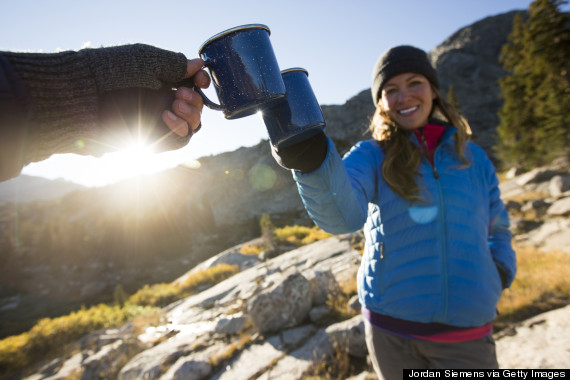Hiking Makes You Happier And Healthier
The Huffington Post By Abigail Wise
Posted: 07/18/2014 8:21 am EDT |
| Stress Market - Your Stress Education Store |
www.cliving.org
Our Products on Amazon.com
Our Products on eBay.com
FREE Book - Be Stress Wise, by Dr Tim Lowenstein
Go to
bestresswisebook.com
and download your copy. Feel Free to share with friends.
Go to
bestresswisebook.com
and download your copy. Feel Free to share with friends.
John Muir was onto something when he said, "In every walk with nature, one receives far more than he seeks." Hikers battle bug bites, blisters and bruises for the sake of overcoming a challenge and enjoying some quality time with nature. But along with the snow-capped mountain tops and ocean views come an abundance of mental and physical perks.
 | |
| Mood or Stress Card - An Easy, Quick test for stress. | https://www.cliving.org/stresscard.htm |
Here's what hikers can teach the rest of us about leading a happier, healthier life.
Hikers are creative.
Forget the caffeine. Those looking for a brainpower boost need not look further than the closest trail. Research shows that spending time outdoors increases attention spans and creative problem-solving skills by as much as 50 percent. The authors of the study also point out that the results may have as much to do with unplugging from technology as they do spending time outside. "This is a way of showing that interacting with nature has real, measurable benefits to creative problem-solving," David Strayer, co-author of the study, tells the Wilderness Society.
Forget the caffeine. Those looking for a brainpower boost need not look further than the closest trail. Research shows that spending time outdoors increases attention spans and creative problem-solving skills by as much as 50 percent. The authors of the study also point out that the results may have as much to do with unplugging from technology as they do spending time outside. "This is a way of showing that interacting with nature has real, measurable benefits to creative problem-solving," David Strayer, co-author of the study, tells the Wilderness Society.
Plus, it's not only the lack of technology and surplus of trees, sunshine and fresh air that contribute to this creativity boost in trail blazers. Researchers from Stanford University's Graduate School of Education found that walking gets the creative juices flowing far more than sitting.
Hikers are seriously fit.

Hitting the trail works out your body as much as it does your brain. Just one hour of trekking can burn well over 500 calories, depending on the level of incline and the weight of the pack you're carrying. Hiking is a great way to get a serious workout without putting too much pressure on your joints. "Trails are often softer on joints than asphalt or concrete," Caroline Stedman, a seasonal Park Ranger at northern Wisconsin's Apostle Islands National Lakeshore, tells The Huffington Post. "So I find myself feeling less stiff and creaky after a hike than a jog down a sidewalk."

Hitting the trail works out your body as much as it does your brain. Just one hour of trekking can burn well over 500 calories, depending on the level of incline and the weight of the pack you're carrying. Hiking is a great way to get a serious workout without putting too much pressure on your joints. "Trails are often softer on joints than asphalt or concrete," Caroline Stedman, a seasonal Park Ranger at northern Wisconsin's Apostle Islands National Lakeshore, tells The Huffington Post. "So I find myself feeling less stiff and creaky after a hike than a jog down a sidewalk."
If you head for the hills, weight loss results are even better. Not only are you burning some serious calories, but altitude itself has also proven a weight loss ally.
Plus, tramping through the trails on a regular basis decreases blood pressure and cholesterol. Logging cardio in the form of hiking can lower blood pressure by four to 10 points, and reduce the danger of heart disease, diabetes and strokes for those at high-risk. And don't lose heart if you're not out of breath on the way back. Both the ups and downs have benefits when it comes to lowering cholesterol, but hiking downhill is two times more effective at removing blood sugars and improving glucose tolerance.
Hiking heals.
Some research suggests that the physical benefits of hiking extend far beyond cardiovascular health, and may even go as far as to help cancer patients recover. In astudy published in the International Journal of Sports Medicine researchers measured oxidative stress (thought to play a role in the onset, progression and recurrence of cancer) rates of women with breast cancer and men with prostate cancer before and after hiking. The study found that long distance hiking trips may improve theantioxidative capacity, which helps fight off disease, in the blood of oncological patients. Another study showed that breast cancer survivors who exercised regularly -- many in the form of hiking -- believed that physical activity complemented their recovery from cancer treatment.
Some research suggests that the physical benefits of hiking extend far beyond cardiovascular health, and may even go as far as to help cancer patients recover. In astudy published in the International Journal of Sports Medicine researchers measured oxidative stress (thought to play a role in the onset, progression and recurrence of cancer) rates of women with breast cancer and men with prostate cancer before and after hiking. The study found that long distance hiking trips may improve theantioxidative capacity, which helps fight off disease, in the blood of oncological patients. Another study showed that breast cancer survivors who exercised regularly -- many in the form of hiking -- believed that physical activity complemented their recovery from cancer treatment.
Hikers are happier.

Research shows that using hiking as an additional therapy can help people with severe depression feel less hopeless, depressed and suicidal. It may even inspire those suffering from it to lead a more active lifestyle.

Research shows that using hiking as an additional therapy can help people with severe depression feel less hopeless, depressed and suicidal. It may even inspire those suffering from it to lead a more active lifestyle.
For those who don't suffer from depression, hiking still offers mental benefits. "Being out in nature, away from the business of our daily lives and technology, can allow people to connect with themselves and nature in a way that brings about peace and a sense of well-being," Leigh Jackson-Magennis, REI Outdoor Programs and Outreach New England Market Manager, tells The Huffington Post.
Interested in taking up the sport yourself? So you're ready to hear the crunch of leaves under your feet and see the world from above. Luckily, it's easier to start hiking than you may think. We talked to the experts to find the best tips for beginner hikers:- Start small. Stepping over tree roots and maneuvering around rocks on a trail can be more tiring that you might imagine, says Stedman. Start out with a few miles at a time and gradually build up to longer treks. "It's also important to start practicing with a pack of some sort," she tells The Huffington Post. "People often underestimate how heavy a backpack might feel until they try hiking 10 miles or so with it."
- Prepare for the worst. Hopefully you won't need to use that first aid kit or emergency shelter, but it never hurts to be prepared. Stedman recommends carrying extra water, snacks, sunscreen, bug spray and at least a small first aid kit, even on shorter hikes.
- Overestimate your trail time. Hiking can be a slower process than newbies realize. That's why Jackson-Magennis suggests erring on the longer side when estimating how long it'll take to complete a trek. As a general rule of thumb -- keeping in mind that time is based off of physical fitness and elevation -- you can expect to cover about two miles an hour. Then, add an additional hour of extra time for every 1,000 feet of elevation gain.
- Don't ignore your own backyard. You don't have to live in the mountains of Colorado to enjoy some quality trail time. Cities, counties and states all have parks or natural areas to get started hiking, says Stedman. Even very urban areas, like New York City or Washington D.C., have green spaces great for shorter hikes.
- Use the buddy system. Two brains are better than one, so partner up and hike with someone who knows the trail or the area well. "It's also important to tell someone where you are going and when you are expected home," Jackson-Magennis tells The Huffington Post.
So long treadmills, we're going rogue! This story is part of our Go Rogue series, where we explore how outdoor sports make us healthier, happier and full of adventure.
stressmarket.com,
P.O. Box 127, Port
Angeles,WA 98362
,
USA
Orders
1.800.578.7377 | Local 360.457.9223 | Fax 360.457.9466
DBA Stress Market, Inc.













